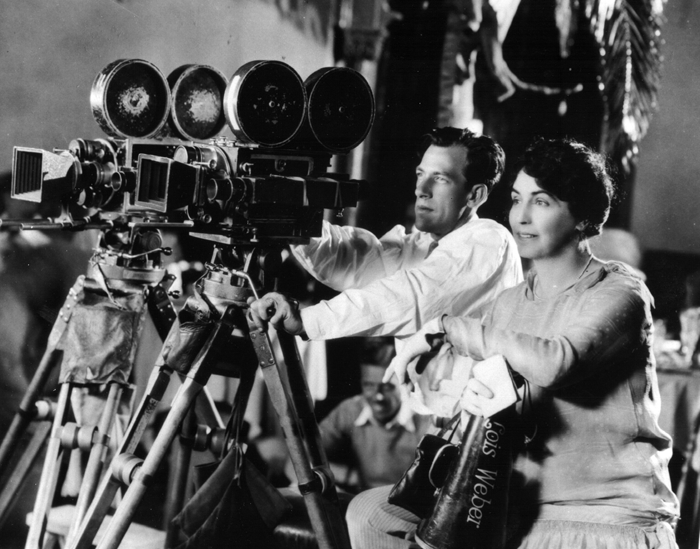Last month, Vanity Fair ran a piece on women directors that claimed that “the feisty Ida Lupino was one of the
first.” They were only off by fifty years. They forgot — or never knew — that Alice
Guy in 1890s France was not only one of the first women directors, but one of
the first directors period. There were dozens of female directors flourishing in
America in the 1910s since, with no rules to follow and no rules to break,
filmmaking was wide open to women. By the time women finally got the vote in
1920, they had been thriving in Hollywood for over a decade.
As hard as some of
us try to put a spotlight on these incredible women, we keep getting articles
such as the one in Vanity Fair. Now Shelly Stamp has made a major contribution
to illuminating their story with her new and revelatory book, “Lois Weber in Early Hollywood” (UC Press).
Lois Weber was the
most successful of all the women directors in the first quarter of the 20th century and, at the time, was placed alongside the likes of D.W. Griffith and
Cecil B. DeMille as the major innovative forces in filmmaking. Starting as an actress,
Weber soon began to write and direct as well, quickly rising to the top using unique
camera angles, split screens and natural backgrounds and locations. With
stories that stressed social significance and questioned prejudice, abortion and the role of women, Weber opposed censorship and the death penalty and
championed the discussion of birth control. She was the highest paid and most
famous of the many women directors who found a booster in Carl Laemmle, the
head of Universal. In turn, Weber actively promoted other women, such as
directors Cleo Madison and Dorothy Davenport, and in 1914, she hired Frances
Marion as her protégée.
I usually resist using
the word “first” to describe people’s accomplishments, but it’s important to
acknowledge that Weber was the first American woman to direct a feature-length
film, the first woman member of the Motion Pictures Directors Association and
the first mayor of Universal City, California. She was also the first, several
years before Mary Pickford, to own her own studio with her own name on it.
Weber’s controversial
films, such as “Hypocrites,” featuring a
reappearing naked woman dubbed “Miss Truth,” packed theaters and
cemented her fame. “After seeing ‘Hypocrites,’”
said Variety, “you can’t forget the name of Lois Weber.” Yet a little
over twenty years later, Variety gave only a few lines to her obituary.
The end of World
War I and President Harding’s “Return to Normalcy” resulted in audiences wanting their
entertainment more reflective of the Jazz Age. Weber was soon renting out
her studio to others as her films lost their box-office allure. Yet she continued
to work, as well as organize and champion women both behind the camera and in
the community at large.
Shelley Stamp has
excavated Lois Weber’s story, digging deep and underpinning her work with solid
research. (One of the great frustrations of writing about the women of early
Hollywood is that, unlike many of their male contemporaries, they did not save
their papers, letters and other original documents. When Frances Marion moved
from California in the 1950s, her secretary salvaged manuscripts and art work
from the garbage.
“Lois
Weber in Early Hollywood” packs a surprisingly emotional wallop. Stamp gives
us a three dimensional, flesh-and-blood Weber who is gradually revealed to be a revolutionary operating under the guise of being a proper matron. What this
woman went through, what she created, how many lives she impacted and
how many times she banged her head against the wall — it’s all here. Her
determination and passion are inspiring. If women in the film business feel
alone today, they need to read this book to never feel alone again.
What
happens to us happened to Weber; she tackled it all and more. Her story is also
an important reminder of the nurturing power of friendship and community. To
understand the life of Lois Weber is to understand a significant era in
filmmaking, as well as a critical era in American history.
Cari Beauchamp is the author of “Without Lying Down: Frances Marion and the
Powerful Women of Early Hollywood” and five other books on film history. Her
latest, “My First Time in Hollywood:
Stories from the Pioneers, Dreamers and Misfits Who Made the Movies,” is an
anthology of first-person accounts by over forty legends in the film business (half of them women) recounting
their first trip to Southern California.
Beauchamp is also the only person to twice
be named an Academy of Motion Picture Arts and Sciences Film Scholar and serves
as the Resident Scholar for the Mary Pickford Foundation. Check out their
website and hers to learn more.






